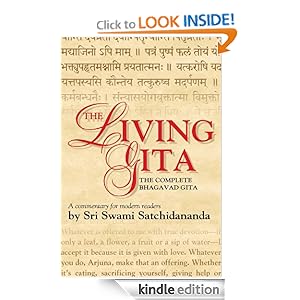During the February full weekend of yoga teacher training, we had some incredibly deep dialogue about the Bhagavad Gita.
The Bhagavad Gita is an ancient text, part of the Mahabharata, an ancient Sanskrit epic along the lines of Gilgamesh. It's basically like a "how to" guide for someone seeking enlightenment, or how to follow the path that will led to an experience of the divine.
The story goes something like this: two royal families of ancient India are locked in a power struggle. The first family engages in somewhat dubious practices of deceit and dishonesty in their reign. The other family is pure in nature and actions.
During a game of dice, the family that is pure of actions loses power to the other family. They say, "Okay, you lost power, tell you what: go into the jungle for 13 years, and when you come out, you can have your kingdom back."
Being trustworthy and honest, the family that is pure of heart goes into the forest and survives for 13 years. They come back, but of course, the dishonest rulers tell them that they cannot have their kingdom back.
Two princes, one from each family, are designated to lead each family in an epic battle. The princes decide to call upon Krishna, an incarnation of God or the Divine, seeking help for their side.
Krishna tells the princes that they have a choice: he will offer one side an army of the finest swordsmen and archers, and the other side can have only him - Krishna.
The prince from the family that is pure of heart, Arjuna, chooses to have Krishna for the battle, leaving the other side with a formidable cadre of fighters.
Both sides gather on the battlefield. They are ready to fight.
But as Arjuna surveys the faces of the people against whom he is to fight, he starts to recognize them: they are his cousins, his uncles, his friends, his relatives. He starts to empathize with them, he starts to feel the pain of their loss, of their wounds not yet inflicted.
It's all too much for Arjuna. He falls at the feet of Krishna and cries out, "I can't do this! I can't kill my own kin! What am I to do?"
And that's where the story begins. Arjuna and Krishna out on the battlefield, ready to fight for the vast kingdom of ancient India, and Krishna begins to outline for Arjuna how to live a virtuous life.
When I started reading this particular interpretation of the Gita, I was feeling very low. I was settled in a hot lavender bath to try to calm my nerves, and I started to read... At the point in the story where Arjuna collapses at the feet of Krishna, I started to cry. Right after I started to cry, I picked up my pen and started making furious scribbles in the margins and between paragraphs, jotting down my thoughts as they came.
After the discussion this weekend, I took away a couple of key things for me that I feel like will help carry me forward from now on:
Maybe it's because I'm still recovering from years of Catholic school and being brought up Episcopalian, but for many years now, I've scoffed at the idea of God. The idea that there's some giant man-like deity that decides my fate and sets down strict rules has never sat well with me. There's always been an element of fear involved in the Christian depiction of God: don't break a commandment, we were told in Sunday school, or ELSE.
But reading the Gita gave me an entirely new understanding of God, or the Divine, as I like to call it. God or Goddess, Nature, or simply the Divine, there is a little spark of that love and purity in all things and in all beings, including ourselves.
After years spent studying the Christian Bible in various classes through Catholic school and Sunday school, I was left with the feeling that we had to deny our very humanity in order to become "good" in God's eyes. I was left feeling that so many of the good things about being human were exactly the things that God would condemn us for.
But the Gita isn't like that. The Gita acknowledges our humanity, with all its flaws and our biases that are created through the senses, and tells us that it's okay to be human. That it's perfect to be human, just the way we are, and because we are all Divine, even what we perceive to be flaws are actually beautiful.
The Gita encourages us to view everyone - especially those who are different from us in every way - as being part of the Divine nature of the Universe. Through the lens of the Gita, everyone we meet is to be recognized as having that part of the Divine within them. Everyone we meet is a teacher, everyone has something to share with us, and everything that happens to us can be seen as a positive experience, not as a punishment.
It's this embracing of the wholeness of everything that appeals to me. I especially need to be reminded that there's something of the Divine Spark within all of us, and that we don't need to hide it or be ashamed of it. We are, truly, all connected, with each other, and with everything around us.
Funny, how things like this come up, because scrolling through my Facebook feed the other morning, I saw a link to a YouTube video that was shared by a yoga friend. Almost like my reading the Gita had set me up perfectly to see it.
Tune it for tomorrow's blog to find out about this YouTube video, and see my reaction, all through the lens of the Gita...

No comments:
Post a Comment